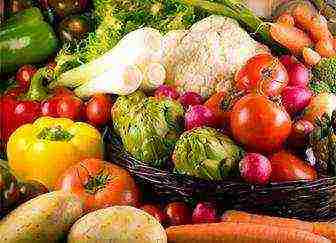Content
- 1 The basics of quailing: where to start?
- 2 Poultry care and maintenance
- 3 Poultry breeding
- 4 Video "Quails from laying eggs to brood quail"
- 5 Bird breeding principles
- 6 Growing young livestock: features
- 7 How to feed the young?
- 8 How to feed the birds properly?
- 9 Interesting Facts
- 10 Benefits of quail breeding
- 11 Breed selection
- 12 What to look for when buying?
- 13 Conditions of detention
- 14 Breeding offspring
- 15 Bird feeding
If in Japan quails have been bred for more than two hundred years, then in Europe and in our country this bird appeared relatively recently. However, even in a short period of time, she managed to fall in love with many farmers and amateur poultry breeders. Interest in this small bird is caused not only by the benefits of eggs and meat, but also due to their early maturity. The cost of breeding quail at home pays off very quickly. If you want to see this for yourself in practice, then we suggest you get acquainted with quail farming in more detail.
The basics of quailing: where to start?
Many novice quail breeders are alarmed by the specific nuances of farming. Yes, indeed, this type of poultry farming is a very troublesome business, the bird requires a lot of attention, care and, we note, completely manual labor. Therefore, before raising quail, it is necessary to weigh the pros and cons, to study specialized literature. If possible, it is better to chat with practicing poultry farmers or personally visit the quail farm. However, we hasten to assure you that all the work is worth it, since the cultivation of these birds pays off handsomely: your family will always be provided with tasty and healthy meat and eggs.

So, if you decide to keep quails, the first thing to start with is to determine the purpose of breeding the bird. The number and size of the poultry farm will depend on this.
- The first option is for yourself. To provide yourself and your family with healthy products, it is enough to keep 10-30 quails. Such a number of birds can be placed in a 40 × 60 cm cage and kept in any free corner of an apartment or house.
- The second option is a home business. In order to profit from quail farming, experts recommend starting to breed with 500 birds. After about a year, with successful farming, the livestock will increase to the size of 5,000 individuals. To do this, you will need a small separate room or a shed with an area of at least 12 sq. m. It is most convenient to keep quails in such quantity in cage batteries - 10-12 batteries each.
After the purpose of breeding birds is determined, you can move on to solving a number of issues: preparing the premises, purchasing or making cages, breeding equipment (incubator, grain grinders), feeders and drinking bowls, where to buy feed, how to compose a bird ration, calculate the approximate costs and time to take care of the household.
Loading …
What breed should I buy?
Today, many varieties of quail are known in the world. But few of them are used on the farm. So, for example, in the general registration book six main quail breeds are indicated: English white and black, Manchu, Pharaoh, Australian yellow-brown, tuxedo, as well as about 60 breed lines. Most of them are raised for eggs and only a few are exclusively for meat, such as the pharaoh.
However, for keeping in an apartment or in the country for beginners, we recommend paying attention to the usual Japanese quail. This breed is available in our country and is suitable for home breeding for both eggs and meat. Beginners choose them for their unpretentiousness to the regime of maintenance and resistance to diseases. Already at the age of 40 days, females begin to rush, and the weight of the male ranges from 110-120 grams.
Poultry care and maintenance
Raising quail at home only seems difficult at first, but not much more difficult than keeping other poultry. Small livestock can be easily bred even in a city apartment. In order for the birds to rush regularly and delight their owners, they need to create comfortable conditions. First of all, it is very important to observe the regime of light and temperature, as well as provide the bird with a balanced protein feed. Let's consider the basic requirements in more detail.
- Premises. The location of the quail farm does not really matter. You can keep a bird seasonally, for example, in a country house, in a country house or permanently in a barn on a personal plot, just in an apartment or in a house, specially equip a garage for this. It is important that the room is dry, warm and well ventilated. The presence of windows is not necessary, but desirable to save light, since the bird will need a lot of it.
- Ventilation. For 1 kg of live weight of a bird, at least 1.5 square meters will be required. m / h in winter and 5 sq. m / h in the summer of fresh air. Therefore, when the quail is kept in an apartment, it is better to place the cages on insulated loggias or near a window.
- Drafts. Quails are very sensitive to drafts. Their presence can be indicated by the loss of feathers, as well as a decrease in egg production. Therefore, in order for the keeping of quails in winter to be successful, it is important to carefully insulate the room.
- Lighting. Quails love light, but not bright. There will be a lot of an ordinary daylight bulb for them, the bird will be excited, provoke cannibalism. The use of a 40 W incandescent lamp or a fluorescent LDC-40 lamp is considered acceptable. When breeding poultry, the light regime should be 17 hours.
- Humidity. Humidity is another important requirement. It must be at least 55%. Otherwise, the bird consumes a lot of water, the plumage becomes brittle, and egg production decreases. Also, unwanted humidity is higher than 75%, but 60-70% is optimal.
- Temperature. For quails, a comfortable temperature is considered to be 20-22 degrees, permissible fluctuations are not lower than 18 and not higher than 25. At temperatures below 18, females stop laying.
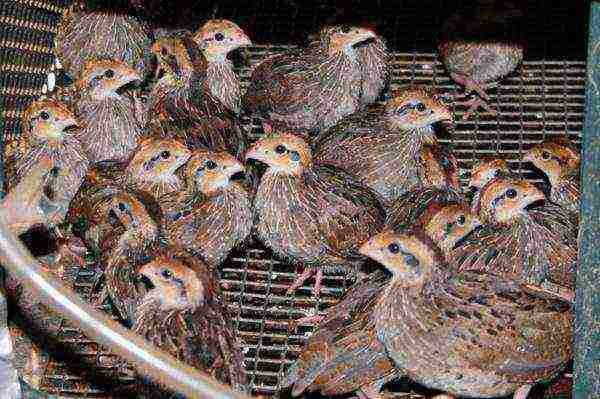
Cells
Cages are the most convenient way to keep quails. They can be bought ready-made or made with your own hands from mesh and plywood. There are no strict requirements for the shape of the cell. Most often they are made rectangular with dimensions 76 × 35 × 30 cm (width × length × height). The floor is best done with a mesh floor with a slight slope towards the trough. Here, a gap is left in the front wall through which the eggs roll into a special chute. Feeders and drinkers are attached to the outside of the front wall of the cage.
A plastic or metal tray is installed under the floor for collecting droppings. Litter must be cleaned every day. To learn more about how to keep these birds, the story of an experienced farmer on video (funnymushroomschool) will help.
As for the area, 100-120 square meters are allocated for one adult bird. cm. It is important that the height of the cage is no more than 25 cm, since at the slightest alarm the quails try to take off. At high altitudes, they can fall and hurt themselves. The stocking density of the birds depends on the age and the purpose of keeping. However, in any case, zootechnical parameters must be observed: per 1 sq. m of floor accommodates an average of 80-100 birds.
Poultry breeding
A very important question is how to breed quail? The fact is that in the process of domestication and domestication of wild birds, females have lost the instinct to incubate eggs.That is, an incubator is needed to brood chicks and breed birds. Some poultry breeders also use bentam brood hens for these purposes. As for the incubator, any mechanical "brood hen" for chicken eggs will do. It is just that the trays are adapted for laying small eggs or special nets are bought.
However, whatever the incubator is, it must meet all the requirements. First of all, it should have an automatic overturn of eggs and constant temperature maintenance at the level of 37-39 degrees.
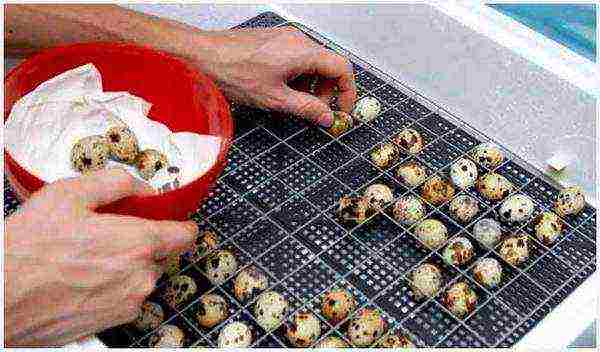
To obtain an incubation egg, females are kept together with males at a rate of 1: 2 or 1: 4. If the birds are kept separately, then the females are planted for 15 minutes. In this case, fertilization is about 80% of cases. But with free mating, as practice shows, the fertilization of eggs is worse. For the most effective tribe, females and males are used for 3 months, after which the herd is renewed.
Growing quail
You can grow quails at home from the first days in a special plywood or cardboard box-brooder. Its size depends on the number of chicks, based on the parameters that 100 quails are placed on a bottom area of 30 × 30 cm. The boxes are covered with either paper or a fine mesh 5 × 10 mm with a pallet at the bottom. The box must be heated and light.
The quails are transplanted into a brooder box as soon as they dry in the incubator. In the incubator, chicks can stay up to 12 hours. Babies are very sensitive to the slightest changes and changes in temperature, which leads to their death. Therefore, especially the first 20 days of life, it is very important to observe a strict temperature regime.
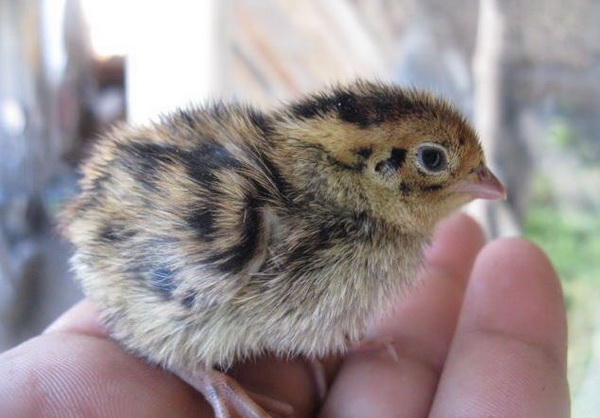
From the first hours after hatching, the quails feed on their own. But due to the very intensive growth and development, they often need to be given nutritious food. In the early days, it can be a finely chopped boiled egg with cottage cheese, yogurt, chopped herbs. Poultry compound feed for young animals aged 1 to 10 days is also suitable.
You can prepare the following mixture:
- bran;
- egg yolks;
- grated carrots;
- fresh herbs (nettles, green onions).
From 3-4 days you can feed with millet, herbs, finely ground wheat groats, small flour worms. The consumption of feed in the first week of life for the maintenance of quail is about 3-4 grams, by the month of life - about 15-16 grams per individual per day. Read more about feeding quail in our next publications.
Chicks are transplanted into regular cages for adult birds at the age of 3-4 weeks. At the same time, they can be divided by gender and by type of feeding: tribe, meat, eggs. We hope our tips will help you succeed in an interesting and rewarding business, and quail breeding and keeping will become a favorite pastime.
Video "Quails from laying eggs to brood quail"
If you want to plunge into the atmosphere of quailing and see how chicks are born, then the video from the Nature and Animal World channel will be interesting.
Rate the article:
(2 votes, average: 5 out of 5)
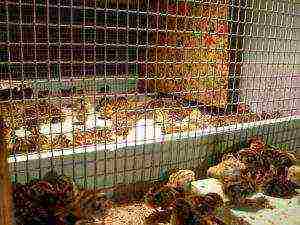 Many people are beginning to think about how to grow quail at home, given the value of dietary meat, eggs of this type of bird. Such food is incredibly healthy, rich in valuable substances and microelements. Birds rush almost every day, so if you keep only a hundred individuals, you can provide your family with a high-quality, natural product. Quail meat is much more expensive, it is considered healthier than chicken.
Many people are beginning to think about how to grow quail at home, given the value of dietary meat, eggs of this type of bird. Such food is incredibly healthy, rich in valuable substances and microelements. Birds rush almost every day, so if you keep only a hundred individuals, you can provide your family with a high-quality, natural product. Quail meat is much more expensive, it is considered healthier than chicken.
Bird breeding principles
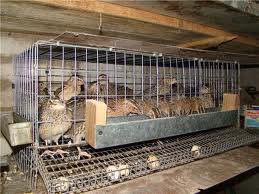 Small birds are bred almost everywhere: in the country, in an apartment, balcony, garage. The main thing is to meet the conditions, temperature conditions. Birds do not need special walking, there is no need to build a chicken coop, a separate building. Today, 50 individuals can easily be housed in a cage of no more than one square meter.
Small birds are bred almost everywhere: in the country, in an apartment, balcony, garage. The main thing is to meet the conditions, temperature conditions. Birds do not need special walking, there is no need to build a chicken coop, a separate building. Today, 50 individuals can easily be housed in a cage of no more than one square meter.
With the correct organization of the conditions of detention, a livestock of 50 individuals can replace 8 chickens in terms of the number of eggs laid. A novice poultry farmer, choosing to grow quails at home from scratch, decides how it is profitable to acquire a farm - buy birds or use an incubator, and independently breed chickens.
How to organize proper conditions of detention?
Taking into account the location of the cage, an optimal temperature regime should be organized. A suitable temperature is from 18 to 20 degrees Celsius, this indicator must be maintained constantly, regardless of the time of day, season and weather outside the window.
Sudden temperature changes can cause quail disease, a decrease in egg production or the death of livestock.
An important condition is a well-executed cell. A novice poultry breeder must pay great attention to this attribute. Each material of manufacture has its own subtleties, features, performance characteristics.
When choosing (making) a cage, it is necessary to take into account the following rules:
 The structure must be made of durable, wear-resistant, reliable materials - metal mesh, plastic, wood.
The structure must be made of durable, wear-resistant, reliable materials - metal mesh, plastic, wood.- The inside should contain 2 trays, be at an angle so that the eggs can roll freely, and the birds do not crush them.
- It is necessary to provide free access for cleaning the droppings to exclude the appearance of infection.
- It should be borne in mind that the height of the cage should be more than 20 cm, so the birds are quite mobile, active.
- The distance from the floor to the beginning of the structure, the pallet should be at least 40 centimeters.
- Large distances should not be allowed between the rods, so that the eggs do not fall out, and the birds remain in the cage.
- The most durable material of choice for most breeders is galvanized steel mesh.
 Answering the question of where to start breeding quails, we can safely say - with the correct organization of the place, the creation or acquisition of a cage. It is not recommended to save on this design. When purchasing cages from your hands, you can buy a product in which a sick bird was previously located, therefore, additional disinfection is required, processing of the structure with special antiseptic substances that prevent the growth of bacteria and microorganisms. Choosing an independent production of a structure, you should strictly observe the parameters - width, height and length.
Answering the question of where to start breeding quails, we can safely say - with the correct organization of the place, the creation or acquisition of a cage. It is not recommended to save on this design. When purchasing cages from your hands, you can buy a product in which a sick bird was previously located, therefore, additional disinfection is required, processing of the structure with special antiseptic substances that prevent the growth of bacteria and microorganisms. Choosing an independent production of a structure, you should strictly observe the parameters - width, height and length.
Should I buy adults or chicks?
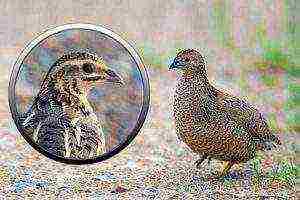 Recently, only a few poultry breeders have chosen to raise quails at home, many are striving to acquire adult birds, or a monthly livestock. Note that the female is able to lay eggs from 1.5 months of age. However, the purchase of birds is always accompanied by risks, so it is better to spend a little effort choosing to raise quail from day 1, having a home incubator.
Recently, only a few poultry breeders have chosen to raise quails at home, many are striving to acquire adult birds, or a monthly livestock. Note that the female is able to lay eggs from 1.5 months of age. However, the purchase of birds is always accompanied by risks, so it is better to spend a little effort choosing to raise quail from day 1, having a home incubator.
Incubation features
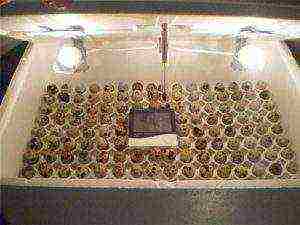 Modern growing of quails in the country can begin with the acquisition of an incubator. Thus, from one dozen eggs after a certain period of time, with proper care, a real poultry farm grows. Eggs are incubated in the same way as chicken, duck or goose eggs. The only thing is a slight difference in humidity, timing and temperature conditions. Most often, the incubator is designed for 100 eggs. To ensure safety and security, it is enough to place each unit on a small piece of cotton wool, or to wrap the fabric around the edges.
Modern growing of quails in the country can begin with the acquisition of an incubator. Thus, from one dozen eggs after a certain period of time, with proper care, a real poultry farm grows. Eggs are incubated in the same way as chicken, duck or goose eggs. The only thing is a slight difference in humidity, timing and temperature conditions. Most often, the incubator is designed for 100 eggs. To ensure safety and security, it is enough to place each unit on a small piece of cotton wool, or to wrap the fabric around the edges.
Consider what rules must be followed:
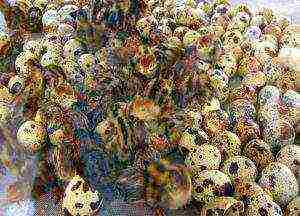 Almost all incubators have a slight deviation in temperature, so the contents must be constantly transferred from one place to another.
Almost all incubators have a slight deviation in temperature, so the contents must be constantly transferred from one place to another.- When choosing to grow quails, you should buy a product that is no more than seven days old, here freshness is the main selection criterion.
- Chicks emerge from the shell after 16-17 days.
- In a day, the egg should be turned 4-5 times.
- For the first 10 days, it is necessary to maintain the incubator temperature at 38.5 degrees, which can be checked using a special sensor, a thermometer.
- In comparison with chicken chickens, quails are born together, maximum - all hatch in 12 hours.
Before hatching for one day, the temperature must be reduced by one degree.Quails that are born later, as a rule, have deviations, they are weaker, lagging behind their counterparts.
Growing young livestock: features
For most beginners, the question of how to grow quail is still relevant. This process takes much less time and hassle when compared to chickens. From the first days of life, young chicks need to create optimal conditions. In advance, you need to prepare a brooder, which is easily made from wooden or cardboard boxes, and pull the net on top. Note, quail diseases - symptoms and their treatment, which are given below, can seriously affect the health of young animals:
 The first sign of poor health is loss of appetite, head tipping back.
The first sign of poor health is loss of appetite, head tipping back.- Grown up chickens can stretch their necks, lower their wings.
- Disheveledness, an unnatural state - these are the first signals for anxiety.
A well-balanced diet helps to avoid infectious diseases; chickens must be provided with vitamins A, D2, and the content of fish meal, meat and bone meal, and yeast must be increased.  A good addition would be crushed chalk, shell rock.
A good addition would be crushed chalk, shell rock.
Poultry farmers with little experience are sometimes interested in whether quail is sick with salmonellosis, let's answer this question: for a long time it was believed that no, given the high body temperature. However, studies have shown that diseases caused by salmonella - pullorosis, have been identified in some individuals, but this is not dangerous for the human body.
How to feed the young?
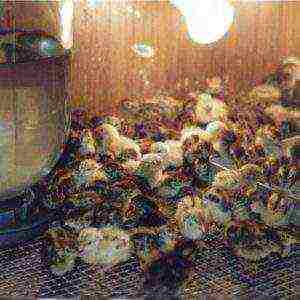 The most complete technology for breeding and rearing quail involves an explanation of how to feed young birds. Initially, you should purchase feeders, drinkers, and other containers with low edges. Drinking bowls are of particular importance. To avoid infection, the spread of bacteria, vacuum models should be chosen. Large containers can allow small chicks to drown.
The most complete technology for breeding and rearing quail involves an explanation of how to feed young birds. Initially, you should purchase feeders, drinkers, and other containers with low edges. Drinking bowls are of particular importance. To avoid infection, the spread of bacteria, vacuum models should be chosen. Large containers can allow small chicks to drown.
The first feeding is a hard-boiled egg, then you can choose the usual compound feed, which is fed to chickens. Chicks grow very quickly, so you need to take care of a comfortable, spacious cage in a timely manner. 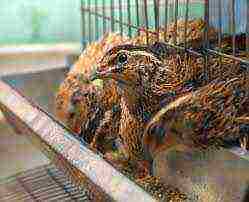 To ensure the optimal temperature regime, the cells can be upholstered with wooden, polycarbonate sheets, while maintaining special openings for air circulation and ventilation. Outside, heating devices are installed to ensure the required temperature.
To ensure the optimal temperature regime, the cells can be upholstered with wooden, polycarbonate sheets, while maintaining special openings for air circulation and ventilation. Outside, heating devices are installed to ensure the required temperature.
Considering the cultivation of quails at home for beginners, you should properly organize lighting, temperature conditions. A rather insignificant and dim light, too bright a luminous flux will cause irritation, aggression of birds.
How to feed birds properly?
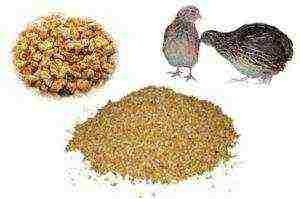 Feeding quail - where to start: note that one bird eats up to 10 kilograms of feed per year, if you calculate the daily rate it turns out - about 30 grams per day. Egg production - 300 pieces per year. Not only the health of the birds, but also the egg production will depend on proper, balanced nutrition. It is advisable to buy feed from trusted, factory-made suppliers. Many experienced farmers recommend feeding the birds with starter feed.
Feeding quail - where to start: note that one bird eats up to 10 kilograms of feed per year, if you calculate the daily rate it turns out - about 30 grams per day. Egg production - 300 pieces per year. Not only the health of the birds, but also the egg production will depend on proper, balanced nutrition. It is advisable to buy feed from trusted, factory-made suppliers. Many experienced farmers recommend feeding the birds with starter feed.
Interesting Facts
 It's no secret where the common quail lives in the wild. The bird lives comfortably near fields, steppes, meadows. Near her dwelling, there are necessarily thickets of grass, weeds, this allows you to provide reliable housing and a varied diet for the chicks. In fact, a small bird has tremendous benefits, it destroys many pests, weed shoots.
It's no secret where the common quail lives in the wild. The bird lives comfortably near fields, steppes, meadows. Near her dwelling, there are necessarily thickets of grass, weeds, this allows you to provide reliable housing and a varied diet for the chicks. In fact, a small bird has tremendous benefits, it destroys many pests, weed shoots.
I wonder how many quails live under natural conditions. According to scientists, a bird can live in the wild for about 5 years, in captivity it is less - only 2-3 years. Although keeping a female for more than 2-3 years is not profitable, egg production drops. The question arises, if low temperatures are fatal for birds, where quails winter in nature, the answer is simple - they fly away to warmer regions.Birds are hard to tolerate low temperatures.
What affects reproduction?
Advantageous cultivation and technology of quail breeding, taking into account the specific features, should answer the question of what affects the reproduction of birds. Initially, you need to pay attention to the choice of the age of the livestock when buying. The younger the individual, the easier it will be to endure the change of living conditions, moving, acclimatization. Only healthy birds can reproduce fully.
When choosing birds, you need to consider: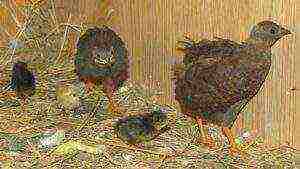
- appearance;
- weight (individuals should not be fat, skinny);
- smooth, dry beak;
- even breathing;
- clean feathers in the area of the cloaca.
For reproduction to be as successful as possible, females are selected - 3-8 months, males - 3-6 months, in a ratio of six females to one male. It is necessary to breed individuals without family ties, in order to avoid hereditary diseases, of the same breed. The incubation instinct in birds is underdeveloped, it follows that the ideal option is to use an incubator.
Healthy appearance
The age of the chick will directly affect the cost of quail for breeding, therefore, in order to save money, you can revel in weekly chicks.
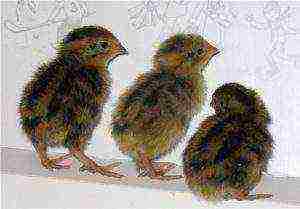 If, after acquisition from specific individuals, symptoms of diseases are observed, any injuries, they should be immediately planted. Some farmers raise birds for meat, then it is necessary to separate females and males into separate cages, it is possible to distinguish the features of the physical structure at the age of one month.
If, after acquisition from specific individuals, symptoms of diseases are observed, any injuries, they should be immediately planted. Some farmers raise birds for meat, then it is necessary to separate females and males into separate cages, it is possible to distinguish the features of the physical structure at the age of one month.
Thus, the main points were considered, answers were found to pressing questions of how to raise quails at home, feed, maintain optimal conditions of detention. Entrepreneurs, ordinary farmers who want to make the transition to a healthy diet, can provide their families with a healthy source of protein food on their own.
.
Quail is an excellent choice for a poultry farmer looking for meat and dietary eggs. The miniature size and unpretentiousness of this bird make raising quails in a private courtyard or even in an apartment affordable for both experienced poultry breeders and for beginners from scratch. Breeding does not require special conditions or material costs, it is characterized by productivity and promising as a business.
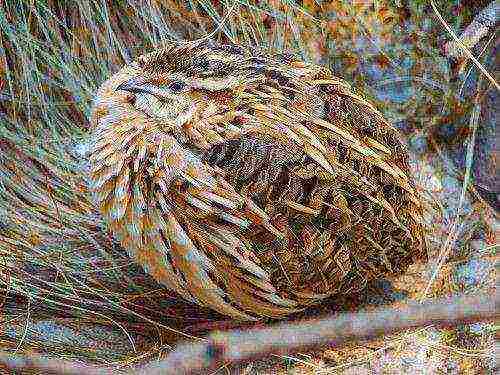
Quail breeding is a profitable business
Characteristic
In the wild in our country, there are European and Japanese subspecies. The latter was domesticated and made an object of quail breeding in Japan, where this tradition goes back several centuries. Now the descendants of the Japanese version are raised for meat or for obtaining egg products in small farms and industrial enterprises.
Breeders brought out representatives of the egg and meat directions. A domesticated variety that is grown for eggs is characterized by the following characteristics:
- quail weight - up to 130 g, females - up to 150 g;
- the beginning of oviposition - from the age of one and a half months;
- productivity - up to 340 pieces weighing 10-12 g annually.
Breeding of broilers has spread in the world to get tasty dietary quail meat. Representatives of this trend weigh from 250 to 500 g.
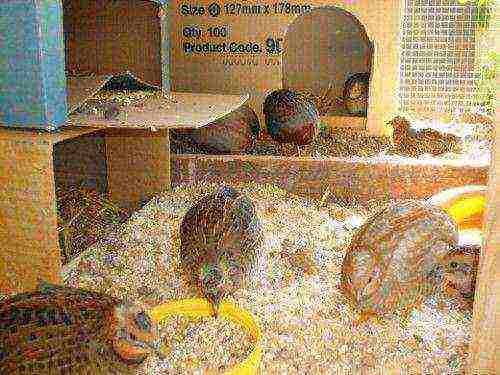
Broiler quail
Breeds
Quails are grown for egg, meat and meat-egg production. Many breeds allow you to choose the right herd in accordance with the main product received:
| Breed | Direction | Color | Weight, g | Egg production,% | Egg product weight, g |
| Japanese | Egg | Yellow brown | 130 (males); 150 (females) | 90 and above | 9-11 |
| Manchurian | Meat and egg | Yellow brown | Up to 300 | 85 | 13-16 |
| English white | Meat and egg | White | 280-350 | Over 85 | 13-15 |
| Pharaoh | Meat | Yellow-brown with stripes | 320-360 (female); Up to 280 (male) | 85 | 12-16 |
| Phoenix | Meat and egg | Yellow-golden | 250 | Over 85 | 12-18 |
| Texas white | Meat | White with black spot | Up to 500 | Up to 85 | 14-16 |
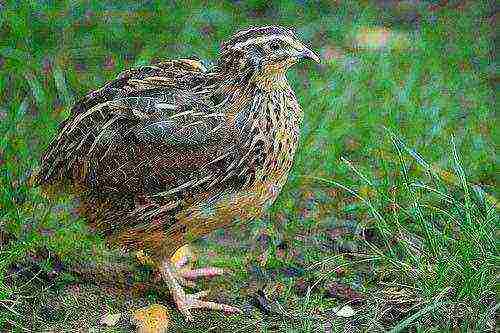
Pharaoh quail
Productivity
Quails have an intense metabolism and high productivity.A quail weighing 120 g lays more than 300 eggs annually, and the egg mass is 20-24 times greater than the female's weight. They are superior in nutritional value to chicken, they do not contain cholesterol. They are also used raw, since quails do not suffer from salmonellosis. Five pieces of quail, equal in weight to chicken, surpass it in content:
- potassium (five times);
- iron (four and a half times);
- vitamins B1, B2, A;
- phosphorus, cobalt, nicotinic acid;
- protein (60% versus 55.8% in chicken), antioxidants.
The color of the shell is from dark variegated to white, the shell is fragile and accounts for 7.2% of the total weight (in other domestic species - 10%). With the help of this product, a number of diseases (internal organs, skin) are treated, the effects of radiation are removed from the body. It does not cause an allergic reaction, on the contrary, the ovomucoid contained there suppresses it. Recommended dosage: for an adult - from 4 to 6 pieces, for a child - from 2 to 3 daily.
Meat is characterized as dietary, it has a high content of vitamin B, minerals, amino acids.
It does not deteriorate and does not lose useful qualities from long-term storage. Recommended for disorders of the gastrointestinal tract, cardiovascular system, diabetes and other diseases.
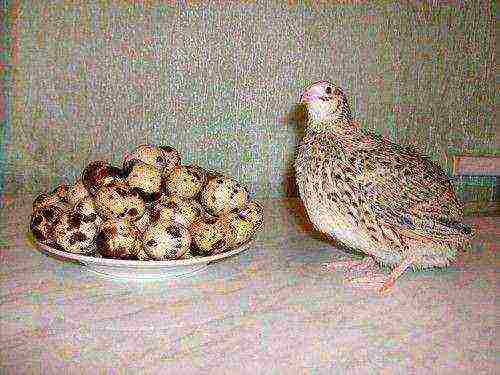
Quail eggs are a valuable dietary product
Reproduction
Quails rush without a male. But if your goal is breeding, then you will need representatives of both sexes. For this, it is better to buy young animals (age - a month or a half). Young quails more easily endure the stress of travel and a new place of residence. When purchasing a livestock, carefully examine it. In healthy specimens:
- clean plumage around the cloaca;
- average weight (not emaciated or overfed);
- dry, no deformation beak;
- breath clear in sound;
- smooth, clean feathers with no dirt or excrement fragments.
For breeding, choose females 3-8 months old, male quails -3-6. Cross specimens of the same breed, avoid closely related mating.
Quails in the process of selection have lost the instinct of brood hens. Use incubators for breeding from scratch and obtaining young stock.
Better use models in which the eggs turn over automatically or semi-automatically. Eggs for hatching chicks are selected from females 2-10 months old, fertilized, no older than a week, weighing 9-11 g.
You can assemble an incubator with your own hands (when keeping and breeding in an apartment):
- place a soft bedding in a cardboard box;
- install a medical thermometer;
- fix the 40 watt lamp on top;
- adjusting its height, achieve a temperature of 37.5-38.5 degrees;
- put a saucer of water next to it (to maintain humidity);
- put the net on the bottom;
- Spread no more than 20 eggs of the same size on the bedding and turn them 3-5 times during the day.
The young will hatch in 17 days. They appear at the same time, within five or six hours.
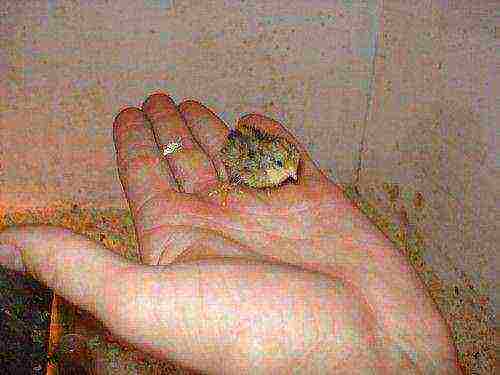
Quail chicken
Offspring
Chicks weigh 6-8 g, they are active from the first hours of life. They are covered with brown fluff, on the back there are two light stripes. If you do not keep track of them, then the young are clogged in the cracks and suffocate, drowning in a saucer of water. Be vigilant and, when the chicks are dry, transplant them into a brooder - a room covered with a mesh net that will fit in an apartment. The size of the brooder is determined by the number of healthy quails.
The overall technology of quail keeping is simple. They feed on their own. Make them a protein diet. In the early days, serve finely chopped boiled white and yolk 5 times a day. From the third or fourth day, add cottage cheese, a combined feed for young chicken (type "Start", after processing in a coffee grinder). On the seventh day, give chopped greens. On days 21-28, feed like adult quails.
Chicks with intensive, balanced nutrition gain 20 times their weight during the first two months.Use a vacuum or nipple drinker for watering to prevent the young from drowning. Give water boiled, warm. For prevention, give quail chloramphenicol in solution to drink.
In the first 14 days, apply lighting in the brooder for 24 hours, then reduce to 17. Young animals need a dry and warm (35-38 degrees) room with ventilation.
If the chicks are cold, then they huddle and squeak (in this case, lower the lamp below). If they stand around the perimeter with their beaks open, raise the heat source. After a week, reduce the heating to 34 degrees, after 2 - to 30 and by the end of the fourth week set it to 22.
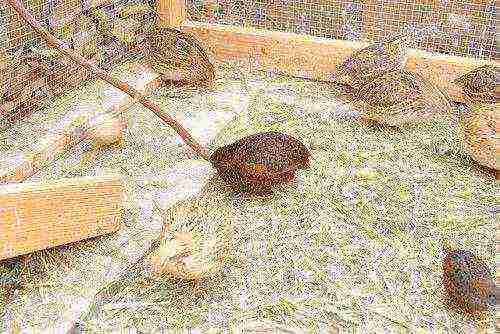
40 day old quails are ready to breed
After 21 days, the quails show external signs of sex. Males acquire a red-brown speckled coloration of the neck and chest; in females, these places are light gray speckled. At 8 weeks of age, young males stop growing, by the 40th day they are ready to reproduce. Males not intended for breeding and rejected females are placed in separate rooms for fattening. In females, the maturation process lasts longer (up to 9 weeks).
Care
Quails are kept in cages, aviaries. Some breeders even choose equipment from cardboard boxes. Birds need an area of 30 by 30 cm (20 to 25 cm high) with 1 male and 3-4 females. With a large room and the previous number of quails, the productivity of the family decreases.
If the height is more than 25 cm, then cover the ceiling with soft material so that the inhabitants of the cage do not break their heads during takeoff. When kept in an aviary with a high ceiling (1.5 m), they do not reach the top.
On an industrial scale, in enclosures for 700 heads, there are up to 20 square meters of area. Cage complexes (multi-tiered batteries), which can accommodate 250 animals, are also used for keeping. The complex consists of several cages with drinkers, feeders and egg collectors. It is easy to make such a structure yourself from plywood, wire mesh and metal sheets.
Quails do not need nests or perches. They lay eggs on the floor. Place the flooring there: straw, shavings, paper, hay. Keep the litter clean, change it regularly to fresh one. Daylight hours for the quail family are no more than 20 hours with a dim source. With lighting for less than 17 hours, productivity decreases, more than 20 - the inhabitants of the cages show aggression, and this leads to the death of the livestock. In poultry farms, daylight hours lasts 18 hours (then three times alternation of 2 hours of darkness and light).
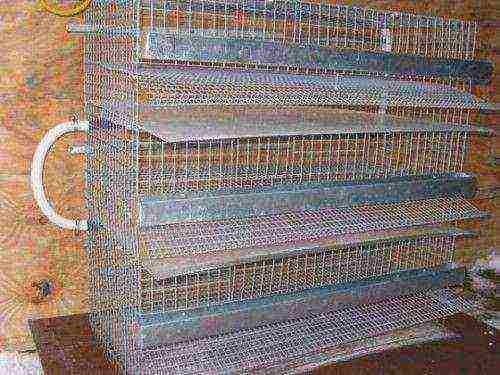
Quail cage
When equipping a cage or aviary, take care of ventilation, but without drafts (otherwise feathers will begin to fall out). Keeping quails requires a dry, warm room with a temperature of 20-22 degrees (fluctuations down to 16 are allowed, up to 25). When breeding in an apartment, it is easy to provide such indicators. If the thermometer drops below 16 degrees, egg-laying will stop. At a temperature of 5 or less, the livestock will die.
Humidity in the quail room is 60-70%. Make sure that this indicator is not less than 55 and more than 75%. To maintain the humidity level, spray the air with water from a spray bottle or water the floor (in winter). Install trays of ash around the perimeter so that the quails arrange dust procedures and get rid of insects in their feathers, and a tray for excrement.
Clean the floor and remove the droppings daily, which is especially important when keeping in an apartment. Perform a full cleaning on both young and adult specimens once a week.
The diet
When equipping feeding and watering places, use portable containers. Feeders and trough-type drinkers are placed outside the perimeter of the cage, and its inhabitants protrude their heads to quench their hunger or thirst. This measure keeps the room clean. Feed the quails 2-3 times a day, allocating 25-30 g of food per head.Do not overfeed the quail family, this decreases egg production.
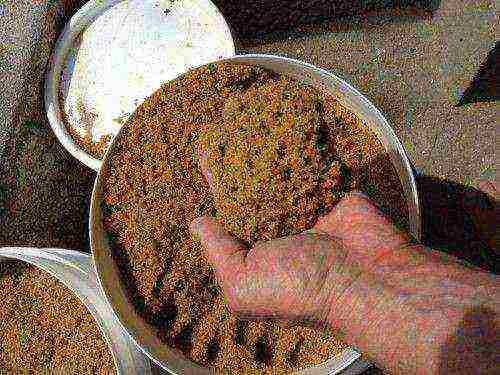
Quail food
Include in the diet of birds:
- chicken feed;
- cereals (oats, barley, millet);
- greens (wheat germ, onions, lettuce and clover);
- vegetable peelings (boiled or raw potatoes, cabbage, carrots);
- sunflower seeds, cottage cheese, sliced eggs;
- fishmeal, chopped raw or boiled fish;
- crushed chalk, crushed eggshells, shell fragments (2-3 times a week);
- fish fat.
When keeping in a private backyard, release pets to the area where they eat slugs and snails. Watch the temperature outside - at least 18 degrees (birds do not like sudden changes). If you breed quail in an apartment, then give them live insects, which are sold in pet stores.
When feeding, avoid offering greens such as tomato, potato, parsley, celery. Solanaceous and buttercup plants, buckwheat, rye cause indigestion and poisoning.
Monitor the color and consistency of the quail droppings. A healthy bird has dense, dark excrement with white streaks. If the droppings are liquid and dark green, this is a sign of illness. A yellow bowel movement indicates an excess of carbohydrate. If the flock has diarrhea, give the oat or rice tincture together with water.
Make sure that the quail family has boiled, warm water. Keep it clean, fresh, change it regularly. Use trough, microcup, or nipple drinkers. Wash the gutter containers daily.
Health
Watch for behavioral changes in the quail family. If the bird is not eating, passive and inactive, isolate it from others and see your veterinarian. After physical injury (pecking due to bright light, lack of space), send the quail to a separate cage until recovery occurs. Females often die from damage to the oviduct due to too intensive clutching. Reduce the level of protein in the feed, shorten the daylight hours.

The health of quails must be carefully monitored.
Fattening and slaughter
Quails intended for meat are divided according to gender. Young males and females are kept separately. The lighting and temperatures are reduced. Heating the cage - up to 24 degrees. It is better to dim the light by creating twilight. In such conditions, males do not conflict, mobility decreases, and food consumption increases. Eating 3-4 times a day. The quails are fed with herbs, grain with a 5% addition of fodder fat.
Broiler males are sent for meat by the end of the second month of life. Females are slaughtered by the end of the first year, after intensive egg-laying has been completed. Before the trial, the birds are not allowed to eat and are given plenty of water.
When slaughtering with a sharp knife blade or a kitchen hatchet, the head is cut off. Let the blood drain, cut off the legs at the level of the lower leg and wings to the second joint with scissors. Hold the carcass with its belly up, tear the skin with your thumbs and remove it along with the plumage. Gut the quail with a knife or finger.

Quail carcasses must be thoroughly cleaned
Additional Information
- birds are also used as fighting birds; in some areas quail singing is valued;
- in Japan, their breeding spread after the bombings in Hirashima and Nogasaki (eggs were included in the school menu to suppress the symptoms of radiation);
- if the birds are fighting, place the instigator of conflicts in another cage or separate him from the flock with a partition;
- quails do not tolerate stress well - take care of the absence of irritants;
- do not place paper or newspapers on the brooder floor to prevent the chicks' legs from moving apart.
Growing quails at home, subject to the rules of care and feeding, will bring the expected result. They are suitable for meat, egg production or decorative breeding. Given the unpretentiousness, rapid growth and low feed consumption, quail farming will become a profitable business.
Subscribe Be aware of new products on our site
In the days of Tsarist Russia, quail meat was an integral part of a luxurious table. The birds were specially hunted, sold and bought. Later, quails lost their former popularity, giving way to larger poultry. In the USSR, tiny eggs appeared only in the sixties and were known as the prerogative of expensive restaurants.
Such inattention to the bird can be called unfair. High egg production and ease of care make these birds an extremely suitable species for farming. And the small size allows you not to spend money on building and equipping premises, but to breed birds in your own house or even an apartment.
How to breed quail
Benefits of quail breeding
Perhaps the only drawback of this bird is its compact size. Of course, when compared with chickens and ducks, quails will lose, especially if the purpose of breeding is to obtain meat. However, it is known that when it comes to poultry, their size is inversely proportional to the quality of meat and other important characteristics of life. Representatives of small species are more resistant to diseases, more often they lay eggs, their offspring survive better and adapt to external conditions.
Separately, it is worth noting the properties of quail eggs, according to which the product undoubtedly outperforms chicken eggs. Quail eggs:
- They contain not only the usual protein, but also a whole complex of trace elements that strengthen the immune system and are necessary for a person to maintain health.
- They include more than twice as many vitamins as chicken eggs.
- They improve the condition of bone tissue, have a beneficial effect on the functioning of the kidneys, heart, pancreas, and nervous system.
- They are a dietary product that does not compromise taste.
- They help to improve digestion and are easily absorbed by the body, so they are often recommended for young children.
- Quails do not have salmonellosis, which makes it safe to eat raw eggs.
Quails rush more often than hens
Of course, chicken eggs are larger, but quails are laid more often. You are guaranteed to be able to get one egg a day. Five quails can easily replace one chicken, and given that they are much easier to keep, the difference in size is justified. Some breeders practice artificially extending the daytime to get two eggs per day, but veterinarians do not recommend this method, as violation of the regime negatively affects the health of the birds.
Quail meat also contains a complex of nutrients and is considered dietary. Its great advantage is the preservation of beneficial properties when frozen.
Breed selection
In general, all quails are similar to each other, but depending on the color of feathers and eggs, productive characteristics, size and behavior, they are distinguished into breeds. There are about 34 quail lines in the world, not counting the individual differences within each. However, in our country, no more than ten of them are common.
Quail breeding tips
If you do not breed quail on an industrial scale, but for yourself, it is not necessary to focus on the breed: the difference will be small. But if this is still important, answer for yourself which goal is paramount for you. Quails can be bred for meat, eggs and decorative purposes.
- If your main goal is meat, consider the Pharaoh, Texas White Pharaoh, Golden Phoenix. These are the largest individuals, which are also characterized by rapid growth. The weight of an adult female can exceed 450 grams.
- To obtain the maximum number of eggs, the Japanese quail is recognized as the best breed. Females begin to lay after 40 days and produce more than 300 eggs per year. Also "egg" breeds include English black and marble quail and kitevers.
- Ornamental birds can be chosen according to personal taste.The most beautiful breeds are Californian, Chinese painted, white English quails.
Comparative table of weight and egg production of popular breeds
What to look for when buying?
It is better to buy animals from poultry farms and other places where they are professionally engaged in breeding. This allows you to avoid cheating and receive comprehensive advice on maintenance and care. Be sure to ask what feed the birds ate on farms and observe this diet at least the first time. A sudden change in living conditions will become stressful for the bird, and it may stop rushing.
It is better to buy quails at poultry farms.
Novice breeders are advised to buy several adults, which are much easier to care for. Remember that the hen does not need a male to produce eggs - this is an autonomous process. But if you plan to get new offspring in the future, you will need at least one representative of the stronger sex. The best age for acquisition is 1, 5 months, it is at this age that the female begins to lay eggs. The season when you buy the bird does not matter, since the birds still need to artificially maintain the desired climate.
Monthly quail is the optimal purchase age for inexperienced breeders
Important! When buying, carefully inspect the bird. Tousled feathers, excess dirt on the beak and paws, moisture, and a lethargic and sickly look should alert you. The same goes for the hoarseness and whistle that a quail can emit.
Choose birds carefully when buying
Conditions of detention
The small size and unpretentiousness of birds allow them to be kept almost anywhere - even in a city apartment. However, two important conditions must be met. The first is the presence of cells: the quail is still a wild bird. The second is an acceptable temperature. In cold conditions (below 5 ° C), birds fall ill and die, and hot (over 25 ° C) negatively affect the quality of feathers, as well as egg production.
Quail cage
If you keep birds in the country, the place should be heated or equipped with heaters. Also, the room must be provided with good ventilation and a humidity level above 65%. If it is not achieved naturally, containers with water should be placed next to the cages or a spray bottle should be used. In summer, during the day, it is permissible to place cells in the yard. But it is necessary to monitor the absence of drafts and avoid contact with wild birds: quails run the risk of catching various diseases.
Features of a homemade quail cage
Quail cages
In order to save money, a house for birds can be made independently, although professional structures are better equipped. The size of the cells should be selected, remembering that 1 sq. m. should not be more than 6 individuals. Closeness reduces the productivity of birds, however, they also do not like spacious aviaries. Too high ceilings will not work either: attempts to take off can lead to bruises.
Quail cage scheme
Example: in a 30x30x30 square cage, contain three hens and one male. It is recommended to make the floor of the cage slightly inclined so that the laid eggs accumulate in one place and it is easy to remove them. The entire floor is covered with filler: sawdust, shavings, dry grass. From time to time it is recommended to add ash - for “bathing” for hygienic purposes.
It is contraindicated to frighten birds with loud sounds or sharp flashes of light - they become alarmed and stop rushing.
Feeding adult quails
Four quails eat the same amount of feed as one chicken, but it is much easier to feed them. Food intake should be carried out three times a day according to the schedule (food is better absorbed when it arrives at the same time). The bird is usually quick to manage its portion (about 30 grams per bird).
Feeding quail according to age
Quail feed recipe
It is better to install the feeder and drinker outside the cage, but so that the bird can reach it - for example, by sticking its head through the bars. Thanks to this, the cleanliness of the cells is better maintained. Otherwise, the bird can climb into the feeder, overturn it and interfere with the feed with droppings, which will ensure unnecessary expense.
Feeding errors and their consequences
Quails do not require any exotic dishes - the diet of birds consists of cultures familiar to us. For feeding you can use:
- Special compound feed from factories.
- Shredded cereals.
- Legumes, sunflower seeds, boiled vegetables, green onions.
- Herbs: dandelion, yarrow, cucumber leaves.
- Small insects.
Making a trough feeder
From time to time, you need to add substances containing calcium to the feed: chalk, egg shells. The addition of minced fish has a beneficial effect on the health of birds. Do not give pets parsley and tops, berries, sorrel, buckwheat.
Breeding offspring
Sexual maturation in quails is early - after 40 days of life. Readiness is evidenced by a soft whistling sound that the female begins to make - this means that soon she will please you with the first egg. However, at first, the carrying will be irregular and the testicular mass will be small. After 1-2 months, this process will gradually return to normal.
Homemade quail egg incubator
Note! Domestic quails do not incubate chicks, this instinct is preserved only in wild individuals. Therefore, you will definitely need an incubator for babies.
It is not necessary to use a large incubator: quail eggs are very compact and easily fit into a container. A standard chicken egg device will do, which will have to be slightly modified with cloth and cotton wool. Due to their size, quail testicles warm up faster and better, do not require coups and other tricks.
The eggs of each individual breed, and sometimes within it, are very different in color. The color can be blue, brown, yellow, gray with numerous variable blotches.
Quail eggs can vary in color
Important! Pre-familiarize yourself with what the eggs of your chosen breed should look like, what is acceptable and what is not. If the color obtained is not within the normal range, this indicates that you have made gross mistakes in nutrition and care, and the bird is sick. A greenish tint of an egg always indicates a problem.
To breed healthy chicks, it is imperative to maintain a certain temperature regime in the incubator. Measurements should be taken with a professional thermometer. The first 10 days the scale should show 38.5 ° С, and only the day before the withdrawal, the temperature can be lowered to 37.5 ° С. Modern models of incubators include water tanks and allow you to maintain humidity. It is best to cover these connectors with gauze to prevent chicks from falling into the water.
Nursing hatched babies
If you can easily make a cage for adults with your own hands, it is still recommended to purchase a professional brooder to hatch chicks. It takes into account the characteristics of the young and prevents possible problems: for example, slipping of the feet on an unsuitable surface or fright due to the noisy crate lid. Brooders have a slatted floor and allow excretion of droppings from the cage, which has a beneficial effect on the health of the chicks.
Quail brooder
Brooders also provide heating and lighting just as much as the chicks require. If you still maintain the regime on your own, remember that in the first month of the chicks life, the temperature should be gradually lowered from 33-35 ° C to 25. This gradually prepares the brood for an independent adult life. Also, in the first two weeks, the lighting in the cage must be maintained constantly, then the daylight hours must be reduced to 17 hours.It is impossible to reduce it more - this will have a bad effect on the reproductive functions of the offspring in the future.
Homemade brooder for quail
The birds can be separated after three weeks. They can be planted according to gender or depending on the purpose: for fattening, for eggs, etc. The sex of a bird can be determined by the plumage on the breast: males are distinguished by small specks and a darker shade. If possible, it is best not to leave two males in the same cage.
Bird feeding
The conditions for keeping birds intended for slaughter are slightly different from those described. A lower temperature is needed here - 20-24 ° С and dim lighting. Birds need to be fed four times a day, of which two times with grain, and twice with fatty feed mixed with corn.
Quail feeding scheme
When the bird reaches a weight of 120 g, it is already considered ready for slaughter (but depending on the breed, a much higher figure can be achieved). Feeding usually lasts about two months. Birds can only be given water for six hours before slaughter.
The composition of the mixture for quail when feeding
Breeding quails is a guaranteed source of wholesome and healthy food for you and your family, as well as an opportunity for passive income when selling meat and eggs on the market.
Average daily requirement of quail for metabolizable energy and nutrients per head
Video - Features of growing quails


